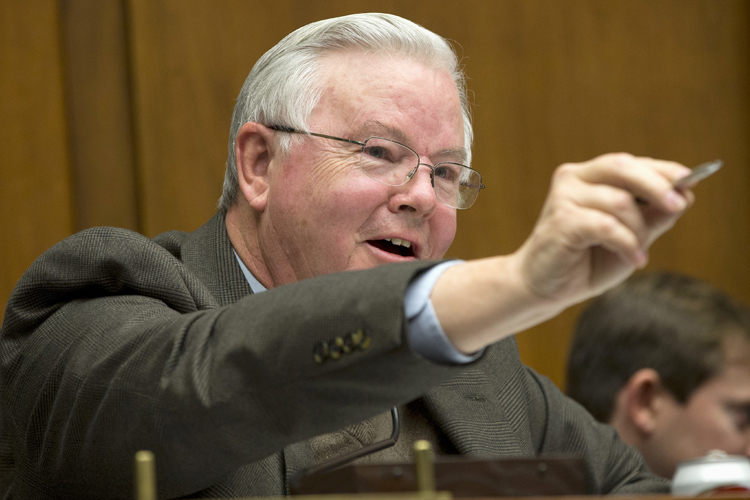Yes, the Affordable Care Act rollout of the exchanges is a mess — and I agree with Brian Beutler and Jonathan Cohn that liberals should be pressing the White House hard to get it fixed, and with Ezra Klein that the ACA’s “success doesn’t depend on spin or solidarity. What matters for the law — and for the people who are depending on it — is how well it actually works.”
So I definitely don’t think the president and his administration should be let off the hook for the very real problems that have plagued the program this month.
Nevertheless, it’s worth noting that whatever their own responsibility for what’s gone wrong, the White House shares responsibility with the Republicans who have spent three years actively attempting to undermine the law. I’m not talking about repeal votes, which (while silly after a while) were totally legitimate, or about running against the program in subsequent elections, which was again entirely fair. No, I’m talking about actions designed — usually openly — not to make the law work better in their view, but to make it harder for the law to work well.
While some of these had obvious direct effects, most of them did not. And it’s hard, in most cases, to draw a direct causal line between disruptive actions and specific malfunctions in the Web site. Nevertheless, it’s hard to believe that any of these actively helped make the program run smoothly, and very easy to believe that the cumulative effect had at least some part to play in the October fiasco. So with all that said, here’s a very incomplete set of eight ways that Republicans attempted, perhaps successfully, to undermine the ACA:
Filibustering personnel: In particular, Senate Republicans prevented the confirmation of an Administrator of the Centers for Medicare and Medicaid until May, 2013. That’s the agency that has the lead in getting things running. The general conventional wisdom, almost certainly true, is that neither an acting director or a recess appointed director has the clout within an agency of a properly nominated and confirmed presidential appointee.
Passing on state-run exchanges: With over half the states refusing to set up their own marketplaces, the job of the federal government was much larger than originally envisioned. And this was clearly not done with good intentions: ask 100 Republicans whether they believe the states or the federal government does a better job running things, and at least 99 are going to say the states.
Defunding: While the recent major defunding push failed, House Republicans successfully restricted funding for Health and Human Services and the agencies in charge of implementing the ACA, forcing Secretary Sebelius (and presumably various others at the department and various agencies) to scramble to make up for it.
Myths and lies: How many times since March 2010 has someone at the White House or a Democrat in Congress called over to HHS to ask about some crazy rumor that the press or a constituent was asking about? How much time was dedicated to figuring out what it was all about so that it could be properly refuted?
The big lawsuit: Granted, there’s some legitimacy in challenging the Constitutional status of a law, as long as it’s not frivolous, and the partial success of the lawsuit is sufficient to show it wasn’t entirely frivolous. Still, the type of attack involved in the lawsuit made it clear that reform opponents, if they couldn’t defeat the law, would be happy to leave it dysfunctional.
Other lawsuits: There have been plenty of these, and many of them really have been frivolous. As with the one that reached the Supreme Court, all of these have had the effect of delaying implementation, given that the status of the law was under fire.
Medicaid expansion: Not only did the state-by-state fights over Medicaid expansion mean that the program could not work as intended — the ability of states to opt out opens up a large hole for the not-quite-poor — but again, just dealing with this must have been yet another distraction.
Suppressing outreach: The administration knew that it had a major task in publicizing the rollout. What made that harder (and, presumably, distracted them from the critical task of making everything work smoothly) was a bizarre and perverse effort to undermine outreach: organizations such as the NFL were threatened if they helped to publicize the law, and an advertising campaign attempted to scare young people away from wanting to carry any health insurance.
Again: it’s hard to draw a straight line between any of these efforts and the administration’s failures. What we do know, however, is that time is limited; any day that a department secretary spends on one part of her job is a day she can’t focus on a different part. And then some of these had direct effects of increasing the amount of work the federal government had to do (such as the decisions not to run state exchanges) or to delay when they could do that work (such as the lawsuits). Others restricted the resources available. And some were just distractions.
Which leaves the question: how does the October rollout go if none of this had happened? If there had been aggressive oversight by Republicans in the House, and perhaps a few repeal votes, but otherwise elected Republicans had done their best to carry out the law even if they disagreed with it? We’ll never know the answer, and again this kind of question is definitely not intended to deflect the share of the responsibility that the president and his administration should take. But my guess? It would have been a whole different ballgame.

